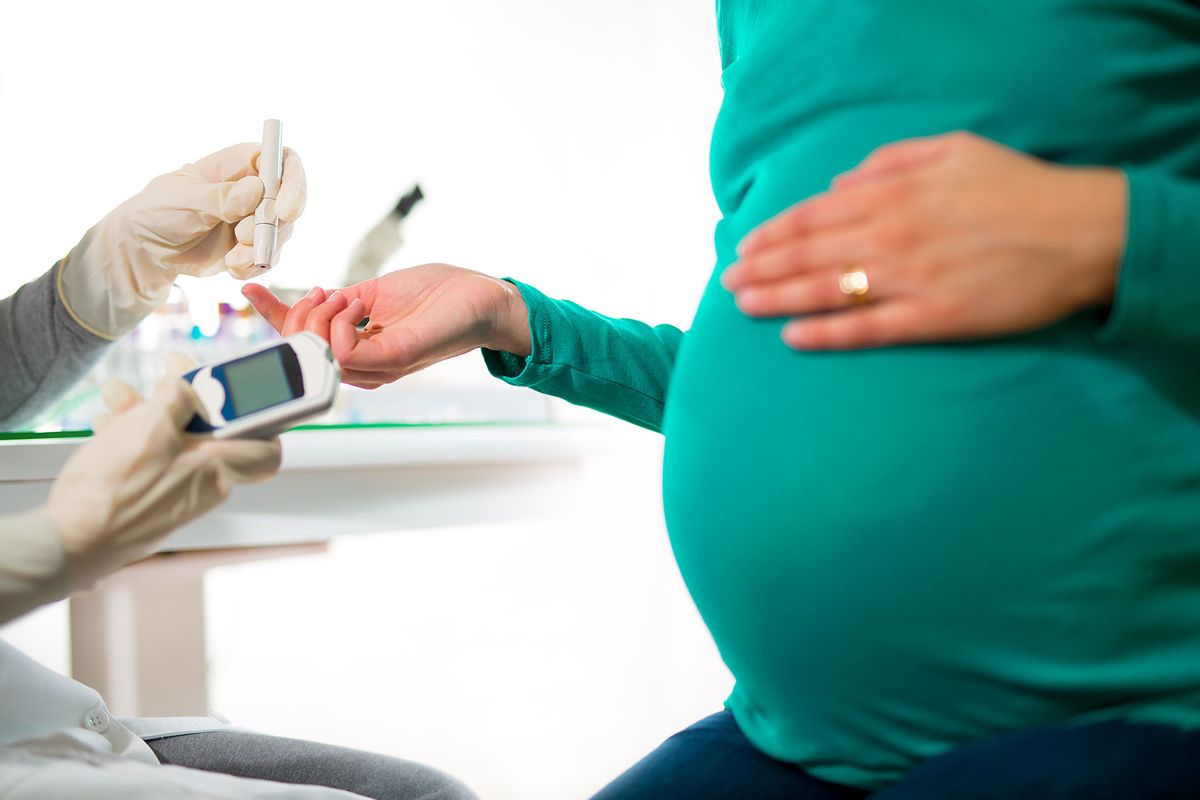Diabetes is a condition most commonly associated with diet and weight, but is also one of the most common complications in pregnancy. Technically known as gestational diabetes mellitus (GDM), it occurs when a pregnant woman — who previously wasn't diabetic — develops the disease thanks to high glucose levels. Despite its lack of recognition as a serious complication for quite some time, research has shown that if left untreated, gestational diabetes can lead to serious consequences, like premature birth or stillbirth. An estimated 2 to 10 percent of pregnancies in the U.S. are affected by the condition, which can also increase a woman's risk of developing diabetes later in life.
Cases of gestational diabetes have been on the rise the last several years, part of a nationwide trend dating back even before the pandemic. But research presented at the Endocrine Society's annual meeting this week showed that cases increased during the COVID-19 pandemic, too.
The results of the study also add more evidence to the connection between COVID-19 and diabetes. Indeed, research has previously suggested that people with diabetes were at an increased risk of having a severe COVID-19 infection. Conversely, having COVID-19 could increase a person's risk of developing diabetes. Now, the trend appears to have applied to pregnant people during the pandemic, too.
Want more health and science stories in your inbox? Subscribe to Salon's weekly newsletter The Vulgar Scientist.
"Gestational diabetes appears to have become more common during the COVID-19 pandemic due to both changes in the population and changes related to the pandemic, which has significant short-term and long-term impact for mothers and their children worldwide," the study's author, Yoon Ji Jina Rhou, said in a media statement. "This study highlights unrecognized implications of pandemics and pandemic-related measures on pregnancy outcomes and the need for initiatives to limit this impact in current and future pandemics."
The way prenatal care changed during the pandemic, oftentimes having online appointments, could have been a contributing factor for the increase
Rhou and her colleagues looked at gestational weight gain, pregnancy outcomes and the birth mother's characteristics in three separate time periods to better understand the trend of gestational diabetes cases and factors contributing to the change. Together, they identified more than 28,000 pregnancies, nearly 50 percent of which took place during the two years before the pandemic started in 2020. More than three-fourths of the pregnant women were non-caucasians and nearly a quarter faced socioeconomic disadvantages. The researchers found that gestational diabetes increased 4 percent from two years before the pandemic to two years into the pandemic.
"Our study showed that the pandemic was associated with a rise in traditional risk factors for gestational diabetes prior to pregnancy and also an increase in weight gain during pregnancy," Rhou told Salon via email. "However, when we performed additional analyses taking these effects into account, we found that the second year of COVID-19 (but not the first year) was independently associated with more gestational diabetes – so there were factors during the second year of the pandemic beyond what we could measure contributing to the increased risk."
The researchers suggested that pre-existing health conditions or lifestyle factors could have played a role in the rise of gestational diabetes cases. Additionally, Rhou told Salon that the way prenatal care changed during the pandemic, oftentimes having online appointments, could have been a contributing factor for the increase, too.
"Women are at significantly higher risk of having gestational diabetes in future pregnancies and developing type 2 diabetes in the future"
"We are unable to confirm what specific unmeasured factors were responsible, but some potential contributors include the impact of lockdowns, gym closures, working remotely and fear of infection on diet and exercise, which have impact that cannot be entirely accounted for by changes in pre-pregnancy weight and gestational weight gain," Rhou said via email. "Psychological stress due to both the fear of infection and escalating restrictions (such as home schooling during school closures and reduced social supports due to border restrictions) is a possible contributor, but more research is needed to explore this."
As Rhou noted, psychological stress has been a known contributing factor. A longitudinal study published in 2016 found depressive symptoms early in pregnancy led to an increased risk of gestational diabetes.
A separate study published in 2022 looking at a smaller cohort of pregnant women found a similar trend of more GDM cases occurring during the pandemic. In the study, which enrolled nearly 1,300 women, researchers found that gestational diabetes cases nearly tripled during lockdown periods, increasing from 3.4 percent before pandemic lockdowns to 9.3 percent.
Rhou said the findings of her research speak to serious long-term consequences that must be taken seriously.
"The women are at significantly higher risk of having gestational diabetes in future pregnancies and developing type 2 diabetes in the future," Rhou said. "The children may also be at higher risk of diabetes and obesity later in life. Both of these impacts may amplify the rising prevalence of type 2 diabetes and cardiometabolic disorders worldwide."



Shares